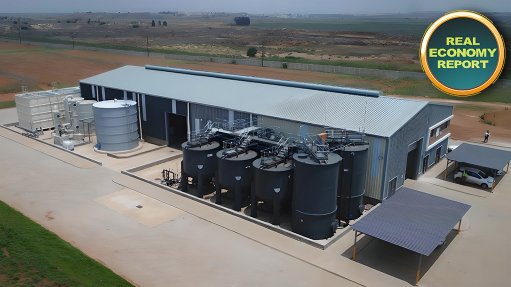Employability in 2020 and beyond – future-proof yourself
This article has been supplied as a media statement and is not written by Creamer Media. It may be available only for a limited time on this website.
ManpowerGroup South Africa Managing Director, Lyndy van den Barselaar
In the past, transformation took decades; today, it is happening at an unprecedented daily pace. Technology is transforming organisations, skills needs are changing rapidly and businesses are struggling to find the talent they need, despite high unemployment statistics in many countries. This is because the world is in the midst of a Skills Revolution, as automation and digitalisation take hold of industries and sectors at different speeds and in different ways – but what does this mean for the future of employability?
Essentially, individuals with in-demand skills who can continually learn and adapt call the shots. With the right skills mix, people will augment rather than compete with technology. Identifying in-demand skills and providing access to employment will be the solution to the Skills Revolution, and as leaders, helping people upskill and future-proof themselves will be the defining challenge of our time.
As skills needs are changing faster, the challenge is that employers do not always know which skills they will need even a year from now. How does one remain employable when the outcome of the Skills Revolution is not predetermined?
Focus on soft skills
What we do know is that the value of soft skills or human strengths continues to rise and is continuously harder to find. Communication, collaboration and creativity are the types of skills that will augment technology and reduce the threat of replacement by automation. In the Skills Revolution, for organisations and individuals alike, the best blend of high-tech and high-touch will be the combination of human strengths with technical and digital know-how.
According to ManpowerGroup research titled Skills Revolution 2.0, more than half of participating companies said communication skills, written and verbal, are their most valued soft skill followed by collaboration and problem-solving.
Besides traditional soft skills, uniquely human traits like empathy, relationship-building, cognitive ability, curiosity and the desire to learn will be the deciding factor in employment decisions for the future.
Continuous learning
Above all, in the digital age, employers must hire people with learnability - the desire and ability to develop in-demand skills to be employable for the long-term. The future of employability is less about what you already know and more about your capacity to learn and be flexible, as the world of work continues to evolve.
Job seekers need to focus on continuous learning, and employers must identify skills adjacencies that create clear career paths from education to employment, from this job to that job. The focus should be on accelerated reskilling programs with faster, shorter bursts of on-the-job, experiential training. This will assist with shifting more people from declining industries to growth sectors, such as textile workers to composite materials technicians or coal miners to coders.
Look to future-proof functions
Most employers expect overall headcount to increase as a result of digitalisation, however, the impact varies by function. According to Skills Revolution 2.0, IT comes out on top as organisations invest in digital skills, and Frontline & Customer-Facing functions are close behind. In contrast, Administrative & Office functions expect the greatest decreases in headcount as a result of automation.
The rise in consumerism and the value companies now place on customer service and last mile delivery are increasingly evident in a digital world, which means roles that are routine or add less value to customers are under greatest threat of automation.
Manufacturing & Production employers anticipate significant churn, as new skills emerge and others become obsolete. Meanwhile, most companies expect headcounts in HR & Finance functions to remain stable. However, as organisations implement new technology and adapt their workforce and skills to leverage it, individuals in these functions will be tasked to drive efficient transformation.
In the Financial Services sector specifically (including financial services, real estate and insurance), the demands for IT hires is expected to be five times greater than the hiring of accountancy staff.
Communication skills are especially important in IT functions where people are increasingly working across teams leading digitalisation. IT is no longer a stand-alone department; today it’s a cross-functional, core element of business transformation. In turn, organisations value front-line workers who can communicate, problem-solve and understand new technology and systems that provide better client service and add value where customers want it most.
Students and job seekers need to ensure they are keeping up-to-date with this kind of research, in order to future-proof their employability in whichever sector interests them – as roles and skills needs will continue to evolve.
Know your strengths
Further to being in the know regarding job functions, and dedicating time to learnability, job seekers need to develop a clear focus on their unique value proposition for future employers. These can be personal attributes, hard and soft skills, passions, and interests, and should be included in your marketing materials, such as your CV, LinkedIn profile, interviewing, etc.
Identify your target career, industries and organisations and dedicate time to learning about their greatest needs through research, and then connect this to your unique value proposition. You have a far greater chance of future employability by helping companies see how you will fit into their organisation.
Comments
Press Office
Announcements
What's On
Subscribe to improve your user experience...
Option 1 (equivalent of R125 a month):
Receive a weekly copy of Creamer Media's Engineering News & Mining Weekly magazine
(print copy for those in South Africa and e-magazine for those outside of South Africa)
Receive daily email newsletters
Access to full search results
Access archive of magazine back copies
Access to Projects in Progress
Access to ONE Research Report of your choice in PDF format
Option 2 (equivalent of R375 a month):
All benefits from Option 1
PLUS
Access to Creamer Media's Research Channel Africa for ALL Research Reports, in PDF format, on various industrial and mining sectors
including Electricity; Water; Energy Transition; Hydrogen; Roads, Rail and Ports; Coal; Gold; Platinum; Battery Metals; etc.
Already a subscriber?
Forgotten your password?
Receive weekly copy of Creamer Media's Engineering News & Mining Weekly magazine (print copy for those in South Africa and e-magazine for those outside of South Africa)
➕
Recieve daily email newsletters
➕
Access to full search results
➕
Access archive of magazine back copies
➕
Access to Projects in Progress
➕
Access to ONE Research Report of your choice in PDF format
RESEARCH CHANNEL AFRICA
R4500 (equivalent of R375 a month)
SUBSCRIBEAll benefits from Option 1
➕
Access to Creamer Media's Research Channel Africa for ALL Research Reports on various industrial and mining sectors, in PDF format, including on:
Electricity
➕
Water
➕
Energy Transition
➕
Hydrogen
➕
Roads, Rail and Ports
➕
Coal
➕
Gold
➕
Platinum
➕
Battery Metals
➕
etc.
Receive all benefits from Option 1 or Option 2 delivered to numerous people at your company
➕
Multiple User names and Passwords for simultaneous log-ins
➕
Intranet integration access to all in your organisation


















